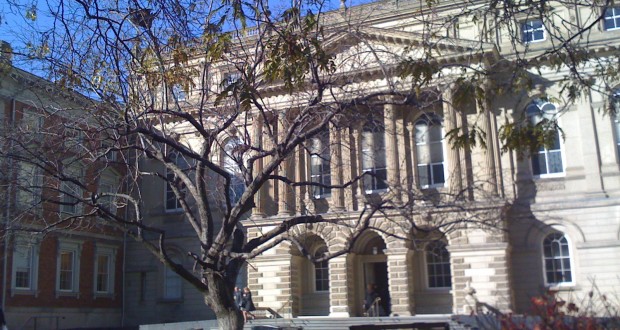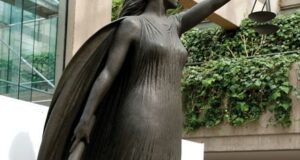On the morning of June 20, 2014, I had the honour and privlege of being welcomed to the Ontario Bar by none other than Mr. Thomas Conway, Treasurer of the Law Society of Upper Canada. His speech to the new inductees, in addition to touching on the historical background of LSUC, went on to outline the importance of the Rule of Law. Mr. Conway charged all those being called that day to uphold the Rule of Law as a cornerstone of Canadian society.
Mr. Conway and the Law Soceity of Upper Canada were gracious enough to allow us to publish his remarks on our site.
Remarks of Thomas Conway, Treasurer, the Law Society of Upper Canada
Toronto Call to the Bar Morning Ceremony: Friday, June 20, 2014
En vertu de l’autorité dont j’ai été investi par le conseil et conformément aux règles qui s’y rattachent, je confère à chacun et à chacune d’entre vous le titre d’avocat‐plaideur ou d’avocate‐ plaideuse et vous admets au barreau de l’ontario.
By the authority vested in me by convocation and pursuant to the statutes in that behalf, i confer upon each of you the degree of barristers at law and call each of you to the bar of ontario.
Congratulations! Félicitations !
We also know that our new lawyers have not travelled this road alone. Your families, friends and spouses have no doubt propped you up and when that was needed calmed you down when that was the better course. Today is a day not just to celebrate your achievement, but to take a moment and to say thanks. So new lawyers – stand up, turn around and take a moment to express your thanks to those who helped you get here today.
Je vous ai dit plus tôt que notre barreau avait été fondé en 1797,
Environ 21 ans après la déclaration de l’indépendance américaine (le
4 juillet 1776), 70 ans avant la confédération canadienne et 185 ans Avant l’adoption de la charte canadienne des droits et libertés.Earlier, i told you that our law society was founded in 1797, about 21 years (july 4, 1776) after the declaration of american independence, 70 years before canadian confederation and 185 years before the canadian charter of rights of and freedoms came into force.
Our law society was founded at niagara‐on‐the‐lake by 10 men, none of whom had law degrees.
Notre barreau a été fondé à niagara‐sur‐le‐lac par dix hommes, dont aucun n’avait de diplôme en droit.
Our first treasurer was john white. He died in 1800, at the age of 39, two years after serving as treasurer. Now if that’s all there was about the life of john white, you wouldn’t remember much about him. But, he didn’t die a natural death. He was killed in a dual for allegedly carrying on an adulterous relationship wth his killer’s wife.
I guess duelling was the 18th century version of alternative dispute resolution. Quick and decisive, but no appeals.
I am pleased to report that since then, none of the 63 subsequent treasurers in our history has died in a duel. And i plan to keep it that way.
Mais les choses ont bien changé ! Aujourd’hui, nous comptons plus de 46 000 avocats et presque 6 000 parajuristes indépendants qui sont membres de notre barreau. Nous sommes, comme on l’a observé ce matin [après‐midi] lorsqu’on a vu les candidats traverser la scène, un barreau diversifié, avec des femmes et des hommes de tous les milieux. La diversité de nos nouveaux avocats est une autre raison pour se réjouir aujourd’hui.
But my how things have changed since those 10 men founded the law society in 1797. Today, we have over 46,000 lawyers and almost 6,000 independent paralegals who are members of our law society. We are, as was evident this morning when the candidates crossed the stage, a diverse bar, women and men from all walks of life. The diversity of our newly‐called lawyers is another reason to celebrate today.
Today is your day. On your day, i want to say a few words about the significance of what has just happened to you, give you a few words of encouragement and a few words of caution.
Our law society was founded in the horse and buggy era. The American republic was in its infancy. The british empire was in its ascendancy and upper Canada was one of its colonies. Humanity had not yet harnessed the power of electricity. Most of the advancements in science and technology were not even imagined, yet alone realized.
Today, 216 years after the founding of our law society, electricity is ubiquitous and runs our technological world. It fuels with heat and light our homes, our businesses, our streets, our auditoriums, our trains and our cars. It runs our computers, cell phones and television sets.
So ubiquitous are electricity and technology in our daily lives that we take them for granted. Only when the power fails, in a storm or in a heat wave, are we reminded of its pervasive role in our lives. To quote Joni Mitchell, we don’t know what we’ve got ‘til it’s gone. When the power fails, we realize that our modern lifestyles depend on the hydro grid, that vast network of power generators, hydro lines, power stations, cables, insulators and conductors. It surrounds us and, in a relatively short time, has become as essential to our modern lives as eating and breathing.
It not only surrounds us, but it is supported and maintained by hundreds of men and women. Whether they work on the line or in the power generating plant, each of them performs a discreet but indispensable function, but no one of them is solely responsible for the entire electrical grid. But together, they ensure that when the stagehands in this auditorium flip a switch, the lights go on.
Oliver Wendall Holmes, the famous american jurist, once described the law as a seamless web. Like the electrical grid, the law touches everything in our lives, was here long before humanity harnessed the power of electricity and was the raison d’être for the founding of our law society.
And when you think about it, you have now become the essential service workers in the preservation, maintenance and promotion of the law.
The law is not a thing that can be touched, but it manifests itself in everything that surrounds us and in our daily activities. For example, the microphone into which i am speaking is the product of innumerable legal relationships and transactions. Its technology is no doubt patented; its manufacturer sourced materials to construct it through supply contracts; it was manufactured by workers with labour and employment agreements; it may have been shipped to north america and subjected to duties and taxes. It may have been sold to a retailer under a retail sales agreement, and its proper functioning is no doubt warranted by the manufacturer under legislation. It is the law and the operation of the law that puts this microphone before me so you can hear my words.
In short, like the electrical power grid, the law, that seamless web, is everywhere in our lives. And like the electrical grid, we often take it for granted.
It is easy to forget the quintessential importance of the law in our daily lives because, for most people, it is almost invisible; like the gossamer web of spider. But let there be no doubt about it: it exists. It is real and it is even more essential to our well being than the electrical grid is to our modern lifestyles.
We have all experienced the inconvenience of an electrical power failure, but imagine what would happen if our legal system failed. It’s easy to do. Just as there are places in the world without electricity, without light, there are today places in the world where the rule of law is not recognized and where the seamless web of the law does not exist or is severely compromised.
One need only glance through the pages of a newspaper or watch the nightly news to see the brutal carnage and chaos that results where there is no check on the base instincts of those who believe themselves to be above the law. People, usually vulnerable people, suffer and die in their hundreds and in their thousands without the rule of law and without the seamless web that supports the rule of law.
As new lawyers, you have become the essential service workers of the law. You are the next generation of lawyers to whom our justice system, our legal power grid so to speak, is entrusted. You must maintain it, adapt it to the circumstances of your world and you are duty bound to improve it and make it better for your fellow citizens.
Each of you, no matter where your legal career may take you, have, each and every day, in small ways and in big ways the ability to strengthen this seamless web, upon which our civil society is built. Through your words and deeds, you have the ability either to strengthen the rule of law or to weaken it.
There will be days when you will be challenged in your task. Your work as a lawyer will be derided. The brutish and the ignorant will devalue your work and your commitment to the law. You will be the butt of bad jokes. On those occasions, it will be hard for you to appreciate the great privilege you have been given and the noble tradition you have inherited. There will be days when you feel you can’t push the boulder up the hill any more.
Although your ability to effect change in the larger system may at those times appear to you to be minimal to non‐existent, remember that your influence over the lives of your clients is both heartening and frightening all at once, but it is to that everyday commitment to your task at hand that will in the end effect the most change to the larger system.
The fibre with the strongest known tensile strength is spider silk. A spider’s web is built of strings of protein that bend, but don’t break even under extremely high forces. Even though it is nearly invisible, when woven together in a spider’s web, it is one of the strongest structures in nature for its size. On a human scale, a spider’s web is virtually impenetrable. Like a spider’s web, the stronger the silk that you lay down in your daily work as a lawyer, in the seemingingly endless, sometimes menial, sometimes thankless tasks you perform on behalf of your client, the more resilient and robust becomes our system of justice, our seamless web, our legal power grid. It becomes more resilient to those forces in the world that do not acknowledge that the rule of law is the cornerstone of our civil society.
Dans votre travail quotidien d’avocat, il faut se rappeler que chaque tâche bien faite, chaque client bien représenté, chaque contrat bien négocié, chaque action honnête envers les autres – qu’ils soient riches ou pauvres, puissants ou faibles – insère un autre fil dans la toile de la loi, un fil qui pliera sans jamais casser.
In your daily work as a lawyer, try to remember that every little task that you do well, every client you represent well, every contract you negotiate well, every honest dealing you have with others ‐ whether they be rich or poor, powerful or weak, mighty or meek – puts in place another “string of spider’s silk” in the seamless web of the law, a string that will bend, but will not break.
Your perseverance will produce endurance and your endurance will produce character, and character produces hope, and hope gives the rule of law its tensile strength. There is a direct line between your daily work as a lawyer and the preservation and promotion of a democratic, free, civil and prosperous society.Au nom du conseil – je vous souhaite beaucoup de succès et je vous offre, à vous et à vos familles, nos plus sincères félicitations !
On behalf of convocation – i wish you all the best and offer our most sincere congratulations to you and your families!
 Advocates for the Rule of Law
Advocates for the Rule of Law



